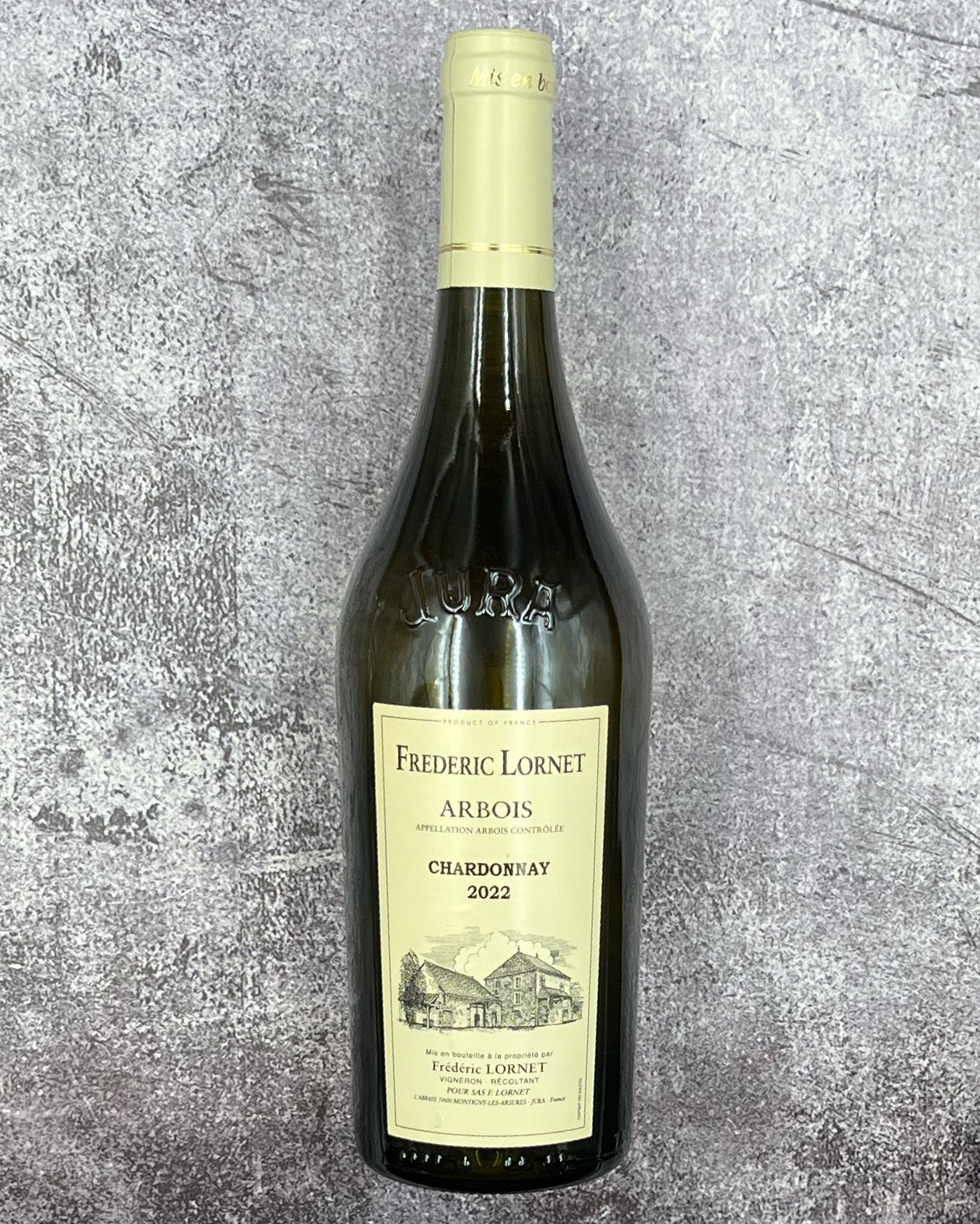Description
From: Jura, France
Varietal: Chardonnay
Taste: This 2022 Arbois Chardonnay from Domaine Frédéric Lornet is delightful and shockingly affordable. On the nose, it opens with bright, herbaceous notes, suggesting the aromatic batter of a French pound cake, replete with zesty lemon, tart yogurt, and a subtle hint of brown sugar. A firm backbone of minerality anchors the taste profile on the palate, accented by notes of salty preserved lemon and crunchy pears. Earthier undertones of fresh white mushrooms and dried peaches emerge at the core, leading to a satisfyingly dense finish. This Chardonnay challenges and rewards the palate with its intricate layers, leaving a lasting impression well after the final sip. We recommend starting this journey with it chilled and then letting it warm up slowly in the glass without corking the bottle. As the wine acclimates to its surroundings, it’ll open up wonderfully and showcase those earthy and stone fruit flavors.
Pairing: To best complement this wine, opt for light fare, such as sautéed scallops (check out the recipe below) or olive-oil roasted chicken with a spritz of Meyer lemon. Pair either with little German butterball potatoes rolled in sea-salt and parsley. Other pairing options include egg dishes such as quiche, French omelet’s , eggs poached in buttery sorrell sauce, and classic soufflé, like Melissa Clark’s Gruyère and Chive Soufflé. Frittata’s and Spanish Tortillas would pair beautifully too! Take your time to savor the evolving flavors in your glass as the wine unfurls its complexities throughout the evening.
Scallops With Sorrel Butter
By Melissa Clark
About. As dedicated wine lovers, we rejoice in the delightful surprises grapes present when grown in new and unexpected corners of the globe. The Jura region of France, situated against the backdrop of the Alpine mountains east of Burgundy, is one such location. Far from the first image to mind at the mention of "Jura," the fresh, high-toned, terroir-driven wines here have a certain vitality that takes us aback. A prime example is the 2022 Domaine Frédéric Lornet Arbois Chardonnay.
This radiant Chardonnay hails from Montigny-les-Arsures atop a luscious vein of Kimmeridgian soil, resulting in a compelling balance between fruit, minerality, and acidity. Bright notes of preserved lemon intermingle with fine salinity and earthy undertones of crushed white rocks. With recent vintages of the Jura region being tested by increased frost, affecting yields more than usual, we were fortunate enough to secure a few cases of this fine specimen for our collection.
At first glance, one might mistake the Arbois AOP Chardonnay for a bottle hailing from Burgundy's Côte de Beaune (on first taste, before the wine has had some oxygen, I’d probably think it from Saint Aubin). However, this unique wine, while resembling its Burgundian counterparts, stands firmly on its own merit. It brings a fresh twist to the classic Chardonnay, bringing a unique cachet to blind tastings and leaving a lasting impression of deliciousness.
Jura's burgeoning popularity among sommeliers belies its tumultuous past. Devastated by phylloxera, mildew, and the First World War, followed by the advent of a new railway system that connected the Languedoc region with urban France, Jura's vineyards were left behind in a quagmire of diseased vines. But the resilient area has since seen a patient, careful resurgence.
In the present day, there are still fewer than 2,000 hectares planted to vine. The distinctive oxidative wines of Jura, reminiscent of Sherry, have gradually given way to a more mainstream style focusing on terroir's subtleties rather than tradition's rigidity. Leading this modernizing trend are producers like Frédéric Lornet, crafting fresher, mineral-driven, 'Burgundian' type of Chardonnay, helping guide Jura into the 21st century.
The Lornet family was among the pioneers in bottling Arbois AOP wines, with Frédéric representing the third generation to oversee the domaine. Their winery, ensconced within a 13th-century Cistercian Abbey, boasts cool cellars that are kept cool by creamy limestone walls. The winery overlooks a patchwork of vineyards, averaging 30 years in age, covering 16 plots once marked out by the abbey's monks.
Lornet's modern winemaking approach, focusing on the freshness of the wines, contrasts with the ancient setting. A careful pressing and racking process, followed by slow, controlled fermentation in stainless steel and then aging in neutral oak, all contribute to creating Chardonnays that shine with the purity of flavor and terroir.
In the words of Master Sommelier Ian Cauble, “This Jura Chardonnay illustrates that a cleaner, more modern style of winemaking doesn’t need to sacrifice the personality of a region...it’s a touch wilder and more fun than that." This delightful and exceptional value-for-money wine is a testament to the revival and revolution in the Jura, signifying a bright future for this ancient wine region.

